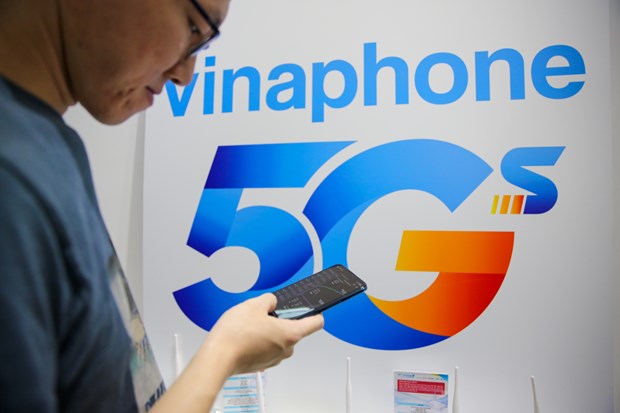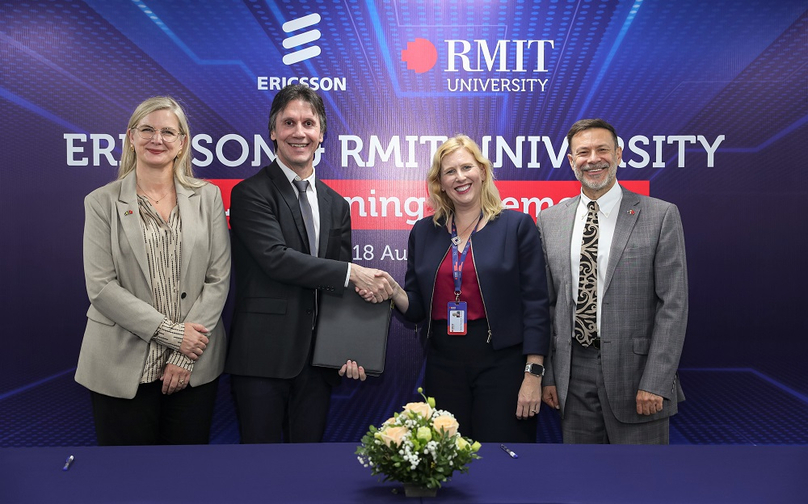Ericsson values Vietnam’s attractiveness as hi-tech foreign investment destination: CEO
In a talk with The Investor, Denis Brunetti - president of Ericsson Vietnam, Myanmar, Cambodia and Laos, speaks about Vietnam’s significant potential to attract high tech foreign investment, particularly in manufacturing and R&D, accelerating the digital transformation of industries and growing the digital economy.
Ericsson has been present in Vietnam for three decades and has contributed to Vietnam’s prosperity. What achievements are you the most proud of?
Ericsson celebrates 30 years in Vietnam in 2023, and we are extremely proud of the contribution we have made to Vietnam’s socioeconomic development and prosperity since 1993 through the mobile communication and broadband connectivity we have provided via the supply and installation of 2G, 3G, 4G and commercial trial 5G network infrastructure and solutions across Vietnam.
Indeed, mobile broadband digital infrastructure has become a critical part of national infrastructure that will continue to drive and create the next wave of inclusive and sustained socioeconomic development in Vietnam, enabled by science, technology and innovation. I’m also very proud that Ericsson has contributed to information and communication technology (ICT) competence and capability development of many thousands of Vietnamese people that have worked for and with Ericsson, including our customers, training them in IT, including 2G, 3G, 4G, and 5G, network design, planning, and implementation.
Ericsson Vietnam has also recently signed an agreement to launch an AI lab in partnership with RMIT University at its HCMC campus, supporting Vietnam’s ambition of becoming an AI hub for ASEAN by 2030. This AI lab initiative paves the way for the potential of future R&D activities that we are also exploring in Vietnam.
Together with RMIT University, Ericsson is already today delivering 5G, IoT, AI/ML, Automation, AR/VR, Edge Computing and Blockchain online training to RMIT’s engineering/science/technology students in Vietnam via the ‘Ericsson Educate’ digital platform.
We have also localized many of our senior management positions in Ericsson Vietnam over the past several years, supporting the development of local Vietnamese leadership in our organization. In addition, we have rotated many of our local Vietnamese talents across a number of international Ericsson markets on a short-term project basis, helping further develop their technical capabilities and international leadership experience.
In 2023, Ericsson decided that Vietnam will become one of our regional ‘Cloud Factories’, with many of our local engineers contributing to regional and global cloud project deployments across Ericsson’s global markets.
A further achievement and contribution to Vietnam’s increased trade has been our ambition to increasingly integrate local Vietnamese suppliers into our Ericsson global supply chain, which has accelerated since the European-Vietnam Free Trade Agreement (EVFTA) was implemented in 2020.
Which factors have retained Ericsson in Vietnam during those years and beyond?
We believe and trust in Vietnam as a stable and highly valued investment destination in terms of high-tech foreign direct investment (FDI), as well as its high potential for R&D investment.
The government of Vietnam has a very clear and inspiring vision for the future of its digital economy, which is expected to account for up to 30% of GDP by 2030, as part of the national strategy for digital transformation and Industry 4.0. By 2030, Vietnam also aims to become a top 30 country on the Global Cybersecurity Index, top 40 country on the Global Innovation Index, and top 50 country on the Global eGovernment Development Index, as well as an AI hub for ASEAN.
Vietnam will also leverage the benefits of 5G digital infrastructure to accelerate the adoption of Industry 4.0, achieving a labor productivity growth rate target of 7.5% per annum by 2030, and helping drive increased efficiencies across all industries, including manufacturing, agriculture, logistics, transport, energy, healthcare, and education.

Vinaphone was the first mobile network operator in Vietnam to be licensed to use 5G in 2020. Photo courtesy of VietnamPlus.
As well as attracting more high-tech FDI through this increased productivity, Vietnam will also use 5G as an education and innovation platform to help stimulate startup entrepreneurship, creating new industries, companies, and jobs of the future.
These are highly motivating and inspiring goals, and Ericsson is fully committed to supporting Vietnam in achieving all of these strategic objectives. As previously highlighted, we are also very interested in exploring the potential of establishing R&D capabilities in Vietnam, leveraging the growing and highly dynamic workforce that is increasingly developing in terms of IT and data science capabilities.
The Vietnamese government is taking steps to accelerate the digital economy. How do you see Vietnam’s potential in this sector and its role in the overall Vietnamese economy? Can it be a critical driving force for Vietnam’s economic growth?
The Vietnamese government has a very strong strategic focus on digital transformation across society, industry/economy and government. This triple pillar approach is visionary and it has Ericsson’s fully support and prioritization.
Since 2017, Ericsson has increased its focus on supporting our mobile operator and service provider customers with mass 4G deployments and 5G commercial trials, particularly in high growth and industrial areas that will eventually benefit from smart manufacturing (Industry 4.0) efficiencies and sustained productivity gains enabled by 5G.
The National Strategy for Digital Transformation and Industry 4.0, together with the Socioeconomic Development Plan for 2021 to 2030, clearly highlight the importance of digital transformation and the digital economy in driving Vietnam’s next wave of inclusive and sustained socioeconomic development.
Vietnam’s digital economy has grown from about $3 billion in 2015 to over $23 billion in 2022, and it is expected to exceed $50 billion by 2025, by which time it will account for up to 20% of Vietnam’s GDP.
Already today, Vietnam ranks in the top three countries in Southeast Asia in terms of the value of its digital economy. Vietnam also ranks at around 48 on the Global Innovation Index, significantly improving year on year. These achievements are due to Vietnam’s increased focus on mobile broadband digital infrastructure, and Ericsson is proud to be contributing our technology leadership to helping achieve these strategic endeavors.
With over 67% of global manufacturing hubs expected to reside in Asia Pacific by 2025, Vietnam is in a great position to attract a significant proportion of this foreign investment, further enabled by the over 16 FTAs that have already been successfully signed, ratified and implemented between Vietnam and global markets, including the EVFTA which I was also proud to have contributed towards achieving as co-chairman of the European Chamber of Commerce (EuroCham) several years ago.
Could you reveal what steps Ericsson is taking to seize opportunities from Vietnam’s digital economy strategy?
Ericsson is clearly focused on continuing to help our customers build 4G networks, whilst also looking forward to the mass deployment of 5G from 2024 to the end of the decade.
Through our collaboration with academia, such as the joint AI Lab partnership with RMIT University in Vietnam, coupled with our internship and graduate programs, Ericsson is also excited about the potential of exploring the establishment of an R&D presence in Vietnam in the years to come.

Ericsson and RMIT sign their AI Lab cooperation deal in the presence of the Australian (first, right) and Swedish (first, left) ambassadors. Photo courtesy of Ericsson.
Ericsson has also established a global sourcing project that aims to integrate local Vietnamese suppliers into the Ericsson global supply chain, helping support our ambition of further increasing our supply chain resilience. In addition, we have established the ‘Cloud Factory’ center of excellence in Vietnam, investing in our local talents to serve the needs of cloud technology deployments across the region.
We project significant data growth in Vietnam, both on 4G as well as future 5G deployed networks. We have seen significant data growth in South Korea and other markets that have launched commercial 5G networks over the past several years, and we are excited and inspired by the significant innovation and business potential this will generate in Vietnam.
We believe that Vietnam has the potential to become a fast-growing startup ecosystem environment that will leverage the digital economy to generate significant socioeconomic benefits to Vietnam, helping attract further domestic and international investment.
Ericsson is proud and dedicated to serving the needs of Vietnam, working in partnership with all mobile operators and service providers to help achieve all the sustained socioeconomic goals of the Vietnamese government through our contribution to the factors that enable and support the growth of Vietnam’s digital economy.
How do you see Vietnam’s business environment now and the government’s recent efforts to improve the investment climate for foreign investors? What needs to be improved?
Vietnam’s economy continues to remain resilient and extremely attractive for foreign investment. Through the Vietnamese government’s tremendous success in implementing 16 FTAs, coupled with the great work done in streamlining administrative procedures, regulations and legal frameworks, Vietnam continues to climb all significant global indices, including the World Bank’s Global Competitive Index and Ease of Doing Business rankings.
This has resulted in many international companies seeking opportunities to invest in manufacturing as well as R&D in Vietnam – this is a trend we expect will continue to dramatically increase, especially in the area of semiconductor design, manufacture and distribution.
Since 2008, the Vietnamese government has continued to allocate 20% of its annual budget to education, and this has contributed to building a highly educated, dynamic and capable workforce for the future. The National Innovation Center and increased focus on startup innovation has also positioned Vietnam well for the many new opportunities that will emerge in the digital age and in the knowledge-based society.
Through these visionary and strategic decisions, coupled with the national strategy for digital transformation and Industry 4.0, and the national strategy for AI research, development and application, international companies, including Ericsson, are aiming to significantly increase their investments in Vietnam over the coming years.




